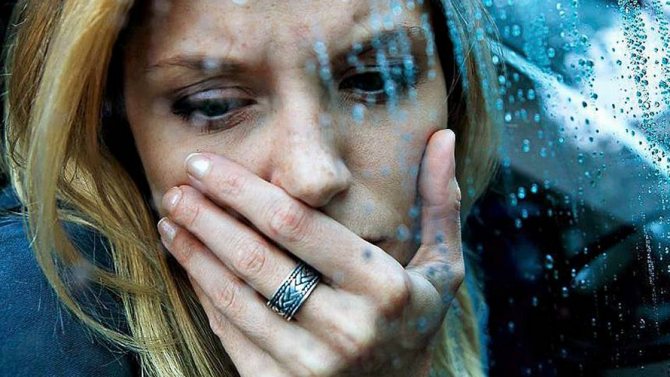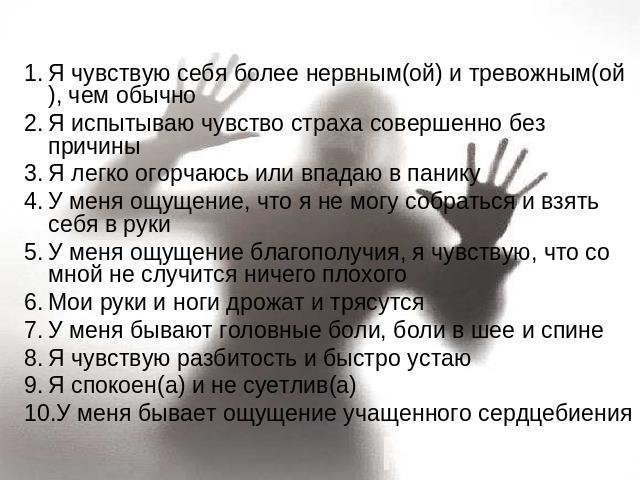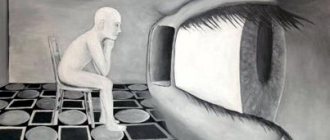Fear of death or thanatophobia can have several causes. From distrust of the world to boredom. For some, the fear of death is beneficial, but for others it is natural.
It is clear that the fear of death is irrational . Because we will all die sooner or later. The fear of death that arises will not help in any way to avoid this. It only brings death closer (nervous tension does not make us healthier). It's just as pointless to be afraid of stepping on poop. When we arrive then we will decide how to get out.
Causes and symptoms of thanatophobia
Often, the fear of death occurs in people who like to control all processes. They always have everything planned out. They are afraid of force majeure. And death is something that cannot be prevented. It cannot be controlled or predicted.
Typical causes of phobia:
- fear of death of close relatives;
- bad feeling;
- fatal disease (oncological, AIDS);
- childhood trauma;
- death of a loved one;
- attendance at a funeral;
- participation in military operations, accidents, emergency situations;
- stereotypical thinking;
- religious beliefs;
- negative experience (long stay in a coma, fainting, consequences of a severe illness), etc.
Another source for the emergence of thanatophobia is the media. Negative information has a bad effect on the human psyche.
He is haunted by thoughts about the meaning of life, his own life after death. The patient is frightened by the mortality statistics in the country and around the world.
The Unconscious Fear Fallacy
Could the problem be that the child in a critical situation made a mistake or made a conclusion that now unconsciously leads to the emergence of fear?
Yes, a child really makes a lot of conclusions about this world and the child’s decisions will influence the personality of an adult. But let's think together, if this were really true then:
- Punishment from his mother in childhood for a boy would mean that he would grow up to be a rag (after all, in his experience there is the fact that he is not able to protect himself from a woman).
- If a child pees himself or craps himself, does that mean that he is an asshole or a pisser for life?
- Will lying to a child mean that he will definitely grow up to be a liar?
- If a child stamps his feet and cries when he doesn’t get what he wants, does that mean he will grow up to be a drug addict, because he cannot restrain his desires?
My comment:
All these examples are just the experience that the child receives. He may or may not use this experience. It is not situations that create our personality, but our choices . Daily choice of how I want to act today.
A child could have had the most cruel childhood and from it he realized that his mission is to give warmth and love to others. Another will decide that only revenge will fix everything. The third will remember everything that happened to him without emotion. Well, yes it was.
It is not childhood that determines what we will be, but our adult choices. We create a new us every day. Of course, we will be drawn to act in the old way, but we can consciously do it differently.
Scary thoughts
A person begins to think a lot about death. He imagines how he will die, what feelings he will experience. Fantasizes about possible causes of death. He thinks about what the reaction of others will be.
Some people have a fear of the unknown. Obsessive thoughts prevent you from sleeping normally and disrupt your normal life processes. In this case, a panic attack occurs, which is the body’s reaction.

Hysteria
If a thanatophobe gets sick, he becomes hysterical. Thinking about death, he is sure that he will not be able to recover and will die. His whole life is accompanied by negative attitudes. Thoughts about a threatening event predominate. He dreams of death, war, his own funeral, a cemetery.
Anxiety
The patient begins to be overly interested in the well-being of loved ones. Fever, high blood pressure, cough and other manifestations of illness cause panic.
Body trembling
When a patient is invited to the funeral of a loved one, he begins to tremble slightly. Sweating increases, headache appears. Feeling dizzy and experiencing muscle weakness. A strong, causeless hysteria is possible.
Most often, this condition occurs in older people. They cannot live in peace, knowing that death can come at any moment.

Depressive disorder appears. The person becomes irritable, aggressive, nervous. He doesn't notice anything good. The holidays no longer spark joy.
Distrust of the death process
The number one reason for fear of death may be mistrust. We are not afraid of death as such, but of the unknown. The person does not trust the world, people and the natural process of death. Many are afraid of change, getting sick, becoming disabled. All these fears have one root - distrust of the world. And if you dig even deeper, it’s a lack of self-confidence.
When a person is NOT confident that he will be able to cope with the difficulties that arise, he automatically begins to be afraid of any changes. Where does confidence in anything come from? - from the experience of interacting with this world.
Let's look at why a person is afraid of, say, dogs? Not because dogs bit him. Each of us was bitten. That's not fatal. The point is that if a person does not know how to enjoy dogs. If he doesn’t stroke them, doesn’t know how to get pleasant emotions from communicating with them, then this entails quite interesting consequences.
When such a person meets a dog running towards him, he can receive either a negative impression from the dog (when it barks at him), or a neutral one - when it does not notice him. That is, every meeting with a dog will create discomfort (it will definitely not bring pleasure). Another person who knows how to enjoy dogs may feel fulfilled when meeting one. What if this dog wants to be petted? And I will enjoy stroking her. That is, for such a person, every dog is a potential source of joy. Yes, the dog can also bark at him, but he can also come for affection.
What do the fear of death and the fear of dogs have in common - my comment :
Psychotherapy as a treatment method
A psychologist diagnoses, prescribes treatment, gives consultations and makes psychocorrection of the patient’s mental disorder. Each client is given an individual course of treatment. The direction of the course is influenced by the causes and symptoms of thanatophobia. The general psychology of the individual is taken into account, on the basis of which the patient’s characteristics are made.
Art therapy
The therapy is based on art healing. A few years ago she limited herself to drawing. Now this is a complex of types of art: literature, modeling, music, dancing, acting, etc. It is important to choose what the patient really likes.
The goal of art therapy is to learn to know yourself, understand emotions and thoughts, and be able to get rid of negativity. The technique is based on sublimation, that is, the transfer of internal conflicts and objects of fear to the result of creativity.

Areas of art therapy:
- abstraction – images in the form of simple combinations of patterns and lines;
- materialization - the drawn picture can be cut, burned, crushed or destroyed in another way;
- games where the main character is fear, which needs to be drawn or shown in some other way.
Art therapy influences personal development, harmonization of the inner world and normalization of relationships in society.
Some patients do not even notice that in the creative process there is a struggle with a phobia.
When drawing, a person should not limit himself. The main thing is complete emancipation.
The results of art therapy can be preserved. Look at it for a while from different angles and in different moods. Subsequently, the patient comes to understand that there is no need to think about death. It is important to feel life right here and now.
Cognitive behavioral therapy
During this therapy, the patient's thinking changes. Negative attitudes are replaced by positive ones. A person learns to analyze his actions, thoughts, and actions. He struggles with an obsessive fear of death.
The doctor’s task is to predispose the patient to be as sincere and interested in healing as possible. After all, a person with a fear of death does not recognize this phobia. Accordingly, he also does not see the need for treatment.
During therapy, the patient is asked questions:
- who said it was bad;
- why did you do this;
- why do you think this is forever;
- what will happen if you do this;
- what happened after the loss of loved ones;
- why are you afraid of funerals;
- what worries you about death, etc.

Based on the answers, the doctor will find out the reasons for the appearance of fear. After which he invites the patient to sit in a comfortable chair, close his eyes and imagine something that frightens him very much - death, a cemetery, a grave, a funeral, etc. It is important that there are manifestations of thanatophobia. The client must describe what he sees.
After this, the patient must abruptly change the picture to a positive one. It should evoke joy, happiness, pleasant memories. Next, the patient must again imagine the objects of his fear. In 1 session, such a task takes 15–20 minutes.
In addition to individual sessions, the client receives homework. They have the highest value, because during the execution process the patient feels discomfort, being alone with himself and leaving his comfort zone.
It is important that the doctor after each session asks the patient to explain what he heard and understood. This is how he checks the effectiveness of the treatment.
Gestalt therapy
During treatment, feelings, actions and thoughts must be one. In psychology this is called Gestalt. In a person without disturbances in the functioning of the central nervous system, this pattern is observed. Those who suffer from death phobia have an imbalance.
Gestalt therapy is the opposite of cognitive behavioral therapy. There is no need to look for the cause of the disease and eliminate it. You need to accept that the problem is there, and that’s normal. According to the idea of the technique, a person should operate with feelings, not reason.
The main objectives of Gestalt therapy:
- Working with emotions. Don't block negative feelings. They can be replaced with positive ones.
- Perceptions of phobia. The patient learns to listen to himself and his feelings. The doctor’s task is to give the right direction.
- Analysis of the past. The client needs to think about what in the past caused his phobia. Perhaps this is a consequence of incorrect upbringing and perception of funerals and death.
- Concentration on the body. The physical manifestations of fear are important to the doctor. It will help the client get rid of mild tremors, rapid heartbeat, headaches, etc.
- The goal of therapy is to help the client find inner support. After treatment, he should receive positive vital energy and continue to work independently on his problem. It is important for the patient to get rid of the childhood fear of cemeteries, graves and death. You need to understand that life is beautiful, and you shouldn’t waste it on empty thoughts.
Exposure therapy
The main idea is to forget about past failures, negative experiences, and fears. There is only the present and the future.
The doctor shows the patient from the outside how he behaves during the activation of the phobia.
Next, he asks the patient to find an interfering behavior - how to behave in order to get rid of thanatophobia. The client must highlight the person’s qualities, characterize him, and identify the positive aspects of such behavior.
There are 3 techniques in exposure therapy:
- Hidden sensitization. The psychotherapist teaches the patient to enter a state of complete relaxation. Then you need to imagine yourself in a situation that frightens and causes a panic attack - a walk to a cemetery, attending a funeral, your own death, the loss of relatives right before your eyes, etc.
- Gradual exposure therapy. The essence is a slow, gradual cure. Sessions take place in a smooth, calm manner. Quiet, relaxing music can be played in the background. It is necessary to very carefully understand the primary sources of thanatophobia. It is important that the client himself suggests treatment options.
- Flood method. The patient is involved in a situation that provokes increased panic and anxiety. The fear must be strong and reach the point of a panic attack or hysteria. This is how the doctor checks how a person will behave if panic occurs again. If no violations are found, the course of treatment ends. Otherwise, the technique changes. The “flood” method is used at the final stage of treatment. It serves as a test for the patient's abstinence in moments of intense fear.
- Another effective method is to “go from the opposite”. The patient does not get rid of internal conflicts and experiences. He changes the type of behavior and attitude towards his own phobia. After all, fear depends on the experiences of the individual.
After treatment, the patient should not have any fear of death. He understands that dying is normal and natural; no one can avoid it.
Phenibut for fear
If a person with his fear of death turns to a neurologist, psychiatrist or psychotherapist, the doctor may prescribe Phenibut, which helps cope with fear. According to reviews from my clients: it really does become easier in the first weeks, but later the “dose” has to be increased because fear appears again.
Why doesn't Phenibut help with fear? No pill will correct the behavior or paradigm of the world. Phenibut may temporarily increase resistance to stress and reduce fear (at a hormonal level). But since the reasons for this fear remain, the unconscious begins to intensify this symptom. Because fear (as strange as it may seem) has a useful function. With fear, our brain says that contact with the outside world (people, animals, nature) is unnatural and harmful.
When a person takes Phenibut, the fear goes away, and the unconscious tries to reactivate this fear, because it still believes that this fear should exist (the reason has not been eliminated). The fear returns, and the person begins to increase the dosage of Phenibut. You understand that this process will not bring anything good to the psyche. A mental problem (or a problem at the level of actions) cannot be corrected with a pill!

Why do psychotherapists prescribe Phenibut knowing that it does not solve the problem, but only pushes it away (after some time, patients return with the same problem, and then stop going to the doctor, realizing that the problem is not being solved). In public clinics, 5 to 15 minutes are allocated per patient. And in order to get to the true root, sometimes I talk with a client for 1.5 hours, sometimes even this time is not enough! Doctors don't have that much time. What can be done in 5 minutes when the head hasn’t switched from the previous patient? Write a prescription without looking. Such a system.
Drug treatment
In combination with psychotherapy, you can take a course of medications. Most have no side effects and are not addictive. Medicines are aimed at mitigating the signs of thanatophobia and calming the patient during hysterics and panic attacks.
Antidepressants
Antidepressants are necessary if the patient has a severe form of mental disorder. They will help if he has been depressed for a long time or has obsessive thoughts. Antidepressants relieve irritation, nervousness, anxiety, and panic.
After use, the patient’s well-being, mood, and emotional state improves. The drug does not cause drowsiness. But its main drawback is that it begins to act after 1 month.

The medicine is sold only with a prescription from a doctor. The following antidepressants are considered the most effective:
- Bellataminal;
- Atropine;
- Fluoxetine;
- Prozac;
- Framex.
It is best to take them before sleep or an event that may activate fear. Remember, for those who are not diagnosed with depression, the remedies will not help.
Sedatives
You can get rid of the fear of death with the help of herbal medicines. They are harmless and do not cause pain. The main components are valerian, motherwort, lemon balm, mint, thyme and chamomile. They reduce nervous excitability, eliminate stomach cramps, and relieve cramps. St. John's wort improves tone and mood.
If the disease is pronounced, it is worth taking combined medications. “Fitosed”, “Persen Forte”, “Novo-passit”, “Dormiplant” are the most effective. They are consumed before bed and promote sleep.
Neuroleptics
Particularly effective when it is necessary to get rid of panic attacks of fear. They have a sedative, anti-anxiety, muscle relaxant, and anticonvulsant effect. Not recommended for use at an early stage.
The drugs have a very strong effect. Sold exclusively by prescription. They are prescribed only in particularly severe cases.
Preventive measures
To reduce the frequency of manifestations of thanaphobia, maintain contact with optimistic people. Communicate with those who inspire and show that life is beautiful, and there is no time to dwell on suffering and fears.
Watch less news and mortality statistics. Doctors recommend avoiding:
- disaster films;
- negative news chronicles;
- books in the horror genre, etc.
They only increase fear and panic. Subsequently, the person becomes nervous and irritated, and the phobia worsens in the subconscious.
Do what you love. It doesn’t matter what it is: creativity, ordinary cleaning or cooking. The activity should be enjoyable. You will not notice how in the process you will forget about your own negative thoughts about death. The disadvantage of this method is the short-term effect.
Some patients become visitors to forums for thanatophobes. This is the wrong decision. It is necessary to avoid contact with people who have similar problems. It’s better to spend time with your family, loved ones, and friends.
Learn to notice details. A compliment from a loved one, delicious coffee, an interesting book, a meeting with an old friend - there are many reasons for joy. Plan every day to make life interesting and rich.
Ascend to the Gods
Today we remember the fearless Vikings , for whom it was an honor to die in battle with a sword in their hands. And they sincerely believed that having parted with life in such a noble way, they would immediately find themselves next to Odin , with their God, at his endlessly continuing feast.
The Vikings believed that having died fearlessly and with valor, they would forever feast with Odin in another world, fight forever, die, and the next day they would rise again and feast again. heaven looked like to the Vikings. Therefore, they were one of the strongest warriors of that time.








